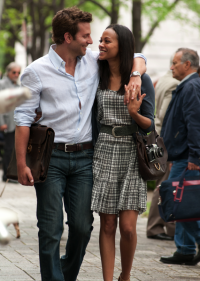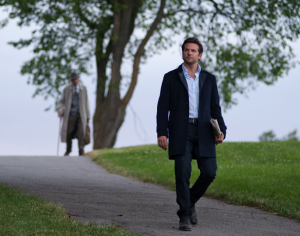TW Review by Martha Nichols
Why a Pretentious Movie About Writers Is Worth Seeing
I was prepared to hate The Words before I saw it. Lord knows, we scribblers need inspiration. But whether cinematic versions of writers are about brand names (Capote, Hemingway & Gellhorn) or fictional authors soulfully fondling their typewriters, these films tend to annoy the heck out of me.
So how come I actually like The Words?
Reading the press release before the movie opened in September, I predicted high-class cheese:
Starring Bradley Cooper, Oscar®-winner Jeremy Irons, Dennis Quaid, Olivia Wilde and Zoë Saldana, the layered romantic drama The Words follows young writer Rory Jansen who finally achieves…literary success after publishing the next great American novel. There’s only one catch—he didn’t write it. As the past comes back to haunt him and his literary star continues to rise, Jansen is forced to confront the steep price that must be paid for stealing another man’s work.
This PR synopsis sounds more coherent than the movie is. The main plot line of Rory Jansen (Bradley Cooper) and his wife (Zoë Saldana) is also the story of the Dennis Quaid character’s latest novel, The Words. Then we get flashbacks to 1940s Paris, voiced by the “Old Man” (Jeremy Irons), which depict the story at the heart of his novel—the one Rory ends up stealing.
There’s cheese at this moveable feast, no question, especially with Dennis Quaid as a big-name author. But the overlapping stories also get under the surface of why people do what they do. This emphasis on internal motivation is the terrain of writers, and The Words conveys the creative process with far more depth than the usual movie clichés.
Meanwhile, most reviewers panned the film. “The story-within-a-story-within-a-story is so slight and inconsequential, like the tiniest of a set of Russian nesting dolls,” writes Christopher Orr of the Atlantic, “that we may be forgiven for letting our minds wander toward bedtime and tomorrow’s errands.” According to Wesley Morris of the Boston Globe, “the first-time writer-directors Brian Klugman and Lee Sternthal have made a drama of spinelessness, passivity, and mild pretentiousness.”
Such reactions reflect an American cultural bias against the interior life—and for that reason alone, The Words deserves a second chance. In comments like “slight and inconsequential” and “spinelessness,” I see critics knocking a very basic literary notion: What goes on in our heads can greatly affect the course of our lives.
In the movie’s most satirical scene, in fact, an agent says to a downcast Rory about his rejected novel, “This book…it’s so interior.” When Rory asks what that means, the agent says, “Artistic?”
The Words fails most obviously, and sometimes laughably, in its portrayal of contemporary writers. In an oddly anachronistic Manhattan, the big names all seem to be men who have blonde grad school groupies. At a literary shindig, we even get “Richard Ford” (John Hannah) standing beside his beefy guest reader (Quaid), wiggling his eyebrows.
The Old Man’s story is rife with macho stereotypes, too: the end of World War Two, an American soldier, a gorgeous French girl. They marry. The soldier becomes a journalist. He pecks away at his typewriter (natch). When tragedy strikes the young couple, he pours his pain into a brilliant novel—the manuscript of which his wife then manages to lose in a briefcase left on a train (shades of poor Hadley Hemingway and that lost suitcase.)
And yet, these scenes, and what the creative work takes out of the young soldier-writer, are some of the most affecting in the movie. They’re resonant because viewers know—if they’ve managed to keep track—that his manuscript resurfaces decades later and falls into Rory’s hands.
For all the romantic folderol, I was intrigued by the plagiarism angle. (What follows is a bit of a plot spoiler, but not much of one.) On their Paris honeymoon, Rory and his wife find the old briefcase in an antique shop. Later, he discovers the manuscript tucked inside, reads it, and is blown away. He falls into a funk about his own inadequacies. Late one sleepless night, Rory types the Old Man’s story into his computer just to experience vicariously what it’s like to write so passionately.
Many creative writing students have typed in paragraphs by their favorite authors—as an exercise, to shake themselves up. Sure, most don’t try to pass off The Sun Also Rises as their own work (or let’s hope they don’t), but it’s not so strange. Yet, the Boston Globe review is dismissive, implying that what the movie really needs is a wicked rogue:
Rory’s deception is made to seem innocent, as if the strings of the cosmos pulled him into a lie. A much riskier movie would ask Rory to enjoy the ruse, to commit fraud rather than drift into it.
I’d argue that this turn of events is what makes The Words more than a silly potboiler. Rory goes along with the deception because his wife reads those computer files and thinks they’re his. Zoë Saldana is very convincing as a stylish woman who loves her husband but also wants him to be more than he is. Rather than “the strings of the cosmos,” fear of disappointing her is what leads him down the Devil’s garden path.
The Words unfolds like a short story. Not the best cinematic strategy, perhaps, and the directors don’t pull it off. Too many emotional peaks are goosed with “serious” music or winces from actors. Still, psychological action matters in this movie—and not just the big, charismatic stuff like deathbed confessions.
You could even call the main plot line a classic New Yorker “chance-to-change” premise—that is, the protagonist is presented with a choice, and the consequences of that choice are what ripple outward and stick with readers. Once Rory meets the Old Man, who confronts him about his literary theft, Rory decides to come clean. But undoing his action is harder than he thinks, and the Old Man offers no absolution.
Is The Words a pompous mess? Sometimes. Does it have lugubrious cello music? Yes. Does some of the dialogue clink like stainless steel tricked up as Baccarat? Oh, yes, especially in the mouth of Dennis Quaid.
It’s also a literary movie with a capital L, and that’s no small thing. If critics call The Words “slight” or unsatisfying, so be it. Me, I’m waving my own beret, applauding a film that dares to pose ethical questions that can’t be tied up in a bow.
Publishing Information
- "The Words": official website.
- “'The Words': A Cinematic Run-on Sentence” by Christopher Orr, Atlantic, September 7, 2012.
- “Stories Just Don’t Add up in ‘The Words’” by Wesley Morris, Boston Globe, September 6, 2012.
Art Information
- Press images from The Words: "Happy Young Writer and Wife," "The Briefcase" (detail), and "Brooding in the Park, Shadowed by Old Man"
Martha Nichols is editor in chief of Talking Writing. She's also a longtime contributing editor at the Women's Review of Books.
"If human beings were perfect, there would be no stories. Most narratives derive their tension from somebody making bad decisions or ending up in a scary place. But how can you overcome something if there’s nothing to overcome?" — "The Devil Made Me Write It"




